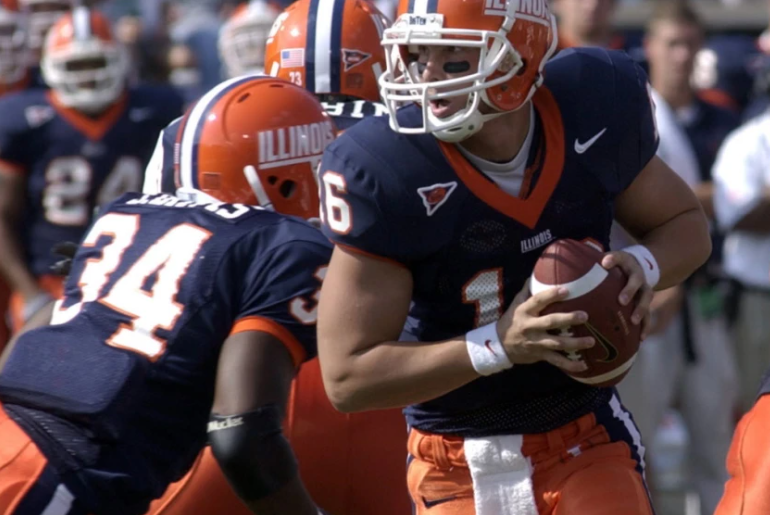Once upon a time, a young Christopher Pazan wowed crowds with his nimble footwork and strategic plays on the football field. Ages before he donned the navy blue, Pazan was revered not only as a quarterback for the University of Illinois but first, a glittering high school football phenom at Brother Rice High School in Mount Greenwood. Back then, his future seemed as polished and promising as a freshly minted dime. Fast forward a couple of decades, and the story has taken a turn more unexpected than a Hail Mary pass.
At 41, Christopher Pazan, having traded his playbook for a badge, now stands accused of something that’s far from the Sunday scuffles of his youth — allegedly shoplifting $300 worth of baseball cards. If your eyebrow is quirking upwards right about now, you’re not alone. This peculiar saga unfolded at a Meijer store on South Western Avenue in Evergreen Park, where a vigilant security guard, armed with CCTV and a hawk-eyed view, reportedly spotted Pazan methodically sliding the pack of sought-after baseball cards into a yard waste bag. Hardly a stealthy sleuth by any detective’s standard, he proceeded to pay for the bag but not the precious cardboard treasures within.
As the plot thickens, the Chicago Police Department, which Pazan joined ceremoniously in 2015, responded less ceremoniously by stripping him of his police powers pending further probing into this kleptomaniac misadventure. The department spokesperson confirmed that Pazan, previously assigned to the Morgan Park District and dabbling in central investigations, is now under a different kind of scrutiny, more akin to the suspects he used to track.
Attempts to contact Pazan or his legal team turned into a wild goose chase, yielding no fruitful comments on the matter. His present predicament rolls out like a clip from an unraveling sitcom about a cop who once played quarterback — just with shades of legal and financial complications twisting the plotlines out of any comedic timing.
Pazan’s trajectory from the gridiron to the police precinct was lofty. Beyond football glory and coaching exploits at Illinois and later at St. Joseph’s College, he took a career detour, driven by a yen to serve. In a 2015 interview, Pazan candidly reflected on this shift, aspiring “to do something more and to serve in a different capacity.” Yet, as fate would have it, service came to a sharp interception — this time not in the end zone but under fluorescent supermarket lights.
Peeking into his wallet, which is ironically far lighter than he might have liked, paints a more candid picture of stress points perhaps motivating his actions. On paper, his take-home city salary clocks in at $111,804, but life is often more complex than figures in columns. Documents reveal financial turbulence rippling through his personal life; he’s entrenched in a divorce and was scheduled for a court appearance the same day of his arrest. Recent legal skirmishes add layers to the narrative, as his former attorney is seeking over $5,800 in unpaid legal fees at a moment Pazan appears to be refinancing his home, presumably to pay for legal expenses and a settlement.
This is not Pazan’s first encounter with fiscal fitness troubles. Fifth Third Bank tried, unsuccessfully, to collect over $4,000 from him a while back. JPMorgan Chase leveled him with a lawsuit for a whopping $15,000 in 2022, a case he managed to settle, with all debts purportedly handled by mid-2024.
According to Chicago’s hiring guidelines, hefty debts might sway an applicant’s quest to join the force. While Pazan evidently passed muster, financial duress remains an ever-present challenge, potentially influencing behavior in unexpected ways.
Pazan now faces a misdemeanor charge for retail theft, with his fate set to unfold with high legal stakes when he appears in court on June 23 in Bridgeview. It’s the kind of story you might only expect on reality television or in a fictional character study, certainly not from a real player’s playbook. It stands as a reminder of the strange turns life can take, tangled in financial webs and personal reckonings, as one tries to sort through the cards they’ve been dealt — stolen or otherwise.
